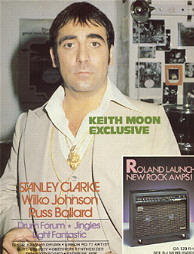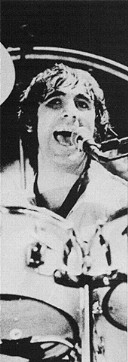 International Musician, September 1978
International Musician, September 1978
 International Musician, September 1978
International Musician, September 1978
 Is there anything new in drums which interests you?
Is there anything new in drums which interests you?

Your kit has grown since last time I spoke to you. How and why has it got bigger?
Well, I added some timbale. The kit changes really as the act changes. When we're doing some stuff from Tommy, there are some really big heavy drum breaks where I bring in timpani and the big floor toms and some timbale for light and shade, so you're not confronted by a big rumble. That can sound very dull, so I use the timbale mainly for accents. You have to hit them hard but then I hit all the drums pretty hard anyway. They're milked up through the PA anyway and, as long as I've got the kit sounding good, it's OK. I have my own PA system virtually so I have to check the sound that comes out of the drum PA. Bill will go round the kit and I'll listen and see what has to go up or down. So, it's not that important to whack 'em hard although I do whack 'em hard. I'm a very physical drummer. In fact, we have to use special mikes for the drums because the amount of air, from hitting it so hard, would produce this "popping" sound - like someone blowing into a mike. So they put windshields on and that helps the tonal reproduction.
Is there a nucleus of the whole kit that you tend to work from?
Yeah. It's obviously the bass drum, tom toms, snare and hi-hat. You see, with double bass drums, I have the hi-hat locked in a half-open position so you get a "swoosh". I don't actually use it as a hi-hat. Both my feet are on the bass drums. So, basically, I get a good ride, hi-hat sound. They just bring in the crowbars! Everything is tightened down and nailed and strengthened with extra screws drilled in. Everything is double braced soI can get up, as we do at the end of the act, and actually stand on the kit without breaking the fittings or ripping them away from the wood. Inside each drum I have a metal plate to support them so I can actually stand on yop of the kit. The whole thing is solid as a rock.
What other drummers have you been listening to recently, or do you listen to other drummers?
Not really, I've been down to a couple of places like the Vortex and the Marquee and it's very odd because I see a lot of myself reflected in their styles. A lot of the atmosphere and a lot of the things they play. It's a bit brash, which I love. I think it's great, just thrashing away, but a lot of the drummers have not developed a definite style. That's something that comes from years of playing, I've picked up bits of Elvin Jones, Krupa, Philly Joe Jones - they were the sort of people I listened to for drumming.
The whole big band scene?
Yeah, mostly big band drummers. They're very dynamic, really wild.
Do you listen to the super-technicians like Cobham, etc.?
No, I'm not really into technical drumming. I don't play a technical drum at all. That Billy Cobham kind of control and disipline is incredible, beautiful but it just isn't me. Then again, I'd be lousy at playing what he does and he's be lousy at what I do. I don't really get off on being able to do so many paradiddles. It doesn't impress me too much. I feel much more at home being very brash and spontanneous.
A few years ago Chris Welch said you deserved an award for "revolutionising rock drumming"
Well, you see, the drummer was always at the back and was very rarely noticed. he was the least photographed, the least interviewed. When The Who started, I began playing a constant drum solo throughout the act and Chris Welch saw us and probably thought "I've noticed the drummer for the first time". In that era, nobody ever took any notice of the drummer. It was all guitars and singers. When I started twirling the sticks and standing up and those kind of things, nobody else did that kind of thing in rock. I'm a total extrovert, I love to be involved. I don't like this great big kit infront of me and the audience. I envy the guitarist who can go over and get that much closer to the audience. I can't do that, I have to sit at the back, so I acted in a different way by acrobatics and all the tricks. So a lot of people used to say "God, look at the drummer!" so I suppose there was a certain amount of revolutionising the drummer's role. Actually bringing the drummer out as an integral part of the group. The group wasn't just made up of a singer and lead guitarist. You used to watch pop shows on TV and they'd just show the singer, the rest of the band being just a backup group and nothing else.
When I started showing off a bit, the directors would notice. There were two great directors, Mike Lindsay-Hogg and Mike Mansfield and they started getting the camera on the drums. "Ready, Steady, Go" and "Top Of The Pops" really treated the band as a whole and, up until then, it was just Billy Fury and hs group or Adam Faith and his group. Most of the TV in those days was only a couple of cameras, one trained on the front of the singer and the other geting a side shot of the singer and they never bothered with the rest of the group. They were always there are part of the furniture. It wasn't until Townshend started smashing guitars and I started smashing up the drums that the producers of the shows began to realise that there was actually more than the singer in a band. They'd actually line up a camera for the drums, which was a first. People started to actually notice the drummer.
What's in the future for you and The Who?
Well, films basically. We've just finished "The Kids Are Alright", thank God! We've been working on that for two years. We've already started pre-production of "Quadrophenia", the casting and that kind of thing and we've got the money for it at last. That's the biggest headache - getting the money to do the picture. Roger's doing the McVicar film which will be done down at Shepperton and pete's been working on the Lifehouse project for quite a while. There will also be soundtrack albums from these plus the studio albums. I often get asked about when The Who will be going on the road and the simple answer is, I just don't know.
Do you miss going on the road?
Not really, cos I'm still involved in so much Who. Everything I do is still all to do with The Who. I enjoy going out on the road. I still get up now and again, and sit in with bands and play but as to putting together another road show and going out on a big tour . . . we've been doing that for 15 years and you can get a bit bored, especially when there are so many new directions opening up for us. We've toured and we've done our bit as regards live tours. I mean, lets not count it out but lets not put it too high on the agenda. There are no plans at the moment for a live gig. You have to look at it very carefully. if we do one here, we get insulting letters from America saying "You do one in London but you won't come to New York. We're just as big fans here as they are there!" You've got to be fair and go to New York, you can't just do one-offs.
The Who, unfortunately or fortunately, attract a big audience and, unfortunately, once you decide to go on the road, you're committed to doing everywhere. If we were to do it, it would mean rehearsals, a new act, and we've got such a lot on our plate at the moment, it's impossible. For years, all we did was tour and now we've got the opportunity to turn Shepperton into a real working project with films, comercials, video theatres, rehearsal stages, our own production companies and all of that. That's as exciting for me as being on the road. I love playing drums but there is more that I can do. Playing drums got me in the position where I can now do other things but to go on the road again, I don't see it as being viable for quite a while.
Can The Who exist without live gigs?
Oh yes. very much so. The Who are still working but we're working in a diferent way. It's very difficult. You spend a lot of time on the road and people start screaming for a new record, you spend time in the studio on a record and people start screaming for a tour - you just can't win. You asked me last time couldn't The Who do small clubs unannounced and the fact remains that it wouldn't work for us; if we went back on the road, we'd go back as THE WHO. It wouldn't be fair to the fans to do a small gig. I think you should do a gig in a venue where everyone can see you. You should give all the Who fans the same chance and not go to some out of the way place. You'd get people saying, "Bastards, what's special about that place?" I don't want that kind of criticism. You can see why it's so difficult. We've just got so much to do first.